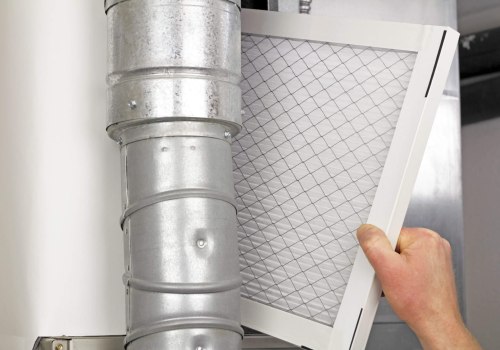Best Furnace Air Filters
In the quest for clean and healthy indoor air, furnace air filters serve as the unsung heroes, diligently purifying the air we breathe.
Much like a fortress protecting against airborne invaders, these filters play a vital role in maintaining optimal air quality.
As we delve into the realm of furnace air filters, we uncover a world of options, each with its unique benefits.
Join us as we explore the top contenders in opting for the best furnace air filters, ensuring your home remains a sanctuary of fresh and pure air.
Types of Furnace Air Filters
There are several types of furnace air filters available for homeowners to choose from. One common type is media filtration, which refers to filters that use physical media to capture particles in the air. These filters are typically made of materials such as fiberglass, polyester, or pleated paper.
Among these options, fiberglass filters are quite popular due to their affordability. They consist of a thin layer of fiberglass fibers that are tightly woven together to create a filter. These filters work by trapping larger particles in the air, such as dust, pollen, and pet dander. However, they may not be as effective in capturing smaller particles, such as bacteria or viruses.
Fiberglass filters are easy to install and replace, making them a convenient choice for homeowners. They are also known for their low airflow resistance, which means that they do not restrict the flow of air through the furnace system. However, it is important to note that fiberglass filters typically need to be replaced more frequently than other types of filters, as they tend to clog up faster.
MERV Rating Explained
Media filtration is not the only factor to consider when choosing the best furnace air filter; understanding the Minimum Efficiency Reporting Value (MERV) rating is also essential. The MERV rating is a numerical value that indicates the efficiency of an air filter in trapping particles of different sizes. It ranges from 1 to 20, with a higher MERV rating indicating a higher level of filtration efficiency.
When it comes to air filter efficiency, a high MERV rating is beneficial for several reasons. Firstly, air filters with a high MERV rating can effectively capture smaller particles, including dust mites, pollen, pet dander, and mold spores. This is particularly important for individuals with allergies or respiratory conditions as it helps to improve the overall air quality in their homes.
Secondly, a high MERV rating means that the air filter can also trap larger particles like dust and debris, preventing them from circulating through the HVAC system and potentially causing damage. This can help extend the lifespan of your HVAC system and reduce the need for frequent maintenance or repairs.
Lastly, air filters with a high MERV rating can also help improve energy efficiency by reducing the strain on the HVAC system. When the air filter traps more particles, it allows the system to operate more efficiently, resulting in lower energy consumption and potentially lower utility bills.
HEPA Filters for Superior Air Quality
HEPA filters, known for their superior air quality filtration, are an excellent choice for individuals seeking optimal particle capture in their furnace air filters. These filters are designed to trap tiny particles as small as 0.3 microns, including dust, pollen, pet dander, and even bacteria and viruses. With their high-efficiency particulate air (HEPA) technology, these filters ensure cleaner and healthier air for your home.
One of the key advantages of HEPA filters is their long-lasting durability. Made from a dense and robust material, these filters are built to withstand regular use and maintain their effectiveness over time. This means you won't have to worry about frequent filter replacements, saving you both time and money.
Additionally, HEPA filters are highly energy-efficient. Their advanced technology allows them to capture a high percentage of particles while still maintaining optimal airflow through the furnace system. This not only ensures cleaner air but also reduces the strain on your HVAC system, leading to improved energy efficiency and lower utility bills.
When choosing a HEPA filter for your furnace, it's important to consider the MERV rating. The Minimum Efficiency Reporting Value (MERV) indicates the filter's ability to capture particles of different sizes. HEPA filters typically have a MERV rating of 17 to 20, indicating their high efficiency in capturing even the smallest particles.
Electrostatic Filters for Enhanced Efficiency
Electrostatic filters offer enhanced efficiency in furnace air filtration. These types of filters use an electrostatic charge to attract and trap airborne particles, such as dust, pollen, and pet dander. The benefits of using electrostatic filters are numerous.
Firstly, they have a high MERV (Minimum Efficiency Reporting Value) rating, indicating their ability to capture a wide range of particles, including smaller ones that may escape other types of filters. This ensures that the air circulating in your home is cleaner and healthier.
Another advantage of electrostatic filters is their reusable nature. Unlike disposable filters that need regular replacement, electrostatic filters can be washed and reused multiple times. This not only saves money but also reduces waste. However, regular maintenance is crucial to maintain the filter's efficiency. Cleaning the filter every one to three months, depending on usage, is recommended to remove accumulated dirt and debris.
When cleaning electrostatic filters, it is important to follow the manufacturer's instructions. Typically, the filter can be rinsed with water and mild soap or sprayed with a cleaning solution specifically designed for electrostatic filters. After cleaning, the filter should be thoroughly dried before reinstalling it in the furnace. It is also important to inspect the filter regularly for any damage and replace it if needed.
Pleated Filters for Extended Lifespan
Pleated filters offer an extended lifespan for furnace air filtration, complementing the enhanced efficiency provided by electrostatic filters. These filters are designed with a pleated structure, which increases their surface area, allowing them to capture more airborne particles. This extended lifespan is beneficial for homeowners as it reduces the frequency of filter replacements, saving both time and money.
One of the advantages of pleated filters is that they often come with an extended warranty. This warranty ensures that the filter will perform effectively for a longer period, providing peace of mind to homeowners. Additionally, pleated filters are known for their energy efficiency. The pleats in these filters not only increase their surface area but also enhance the airflow. This allows the furnace to operate more efficiently, reducing energy consumption and saving on heating costs.
Furthermore, pleated filters are capable of capturing smaller particles compared to other types of filters. This is particularly important for individuals with allergies or asthma, as these filters can help remove allergens and improve indoor air quality. By trapping dust, pollen, pet dander, and other contaminants, pleated filters contribute to a healthier and more comfortable living environment.
Activated Carbon Filters for Odor Control
Activated carbon filters are an effective solution for controlling odors in furnace air filtration. These filters are designed to remove unpleasant odors and chemicals from the air, providing a fresh and clean environment. Activated carbon filters work by trapping odorous molecules in the tiny pores of the carbon material, effectively neutralizing them and preventing them from circulating in the air.
One of the key benefits of activated carbon filters is their ability to remove a wide range of odors, including those caused by cooking, pets, smoke, and chemicals. This makes them an ideal choice for households with specific odor concerns or those living in areas with high levels of pollution. Additionally, activated carbon filters can help improve indoor air quality by reducing the presence of harmful pollutants and allergens.
In terms of air purification, activated carbon filters are highly effective. They can remove volatile organic compounds (VOCs), which are commonly found in household products, as well as other harmful gases and chemicals. This makes them a valuable addition to any furnace air filtration system, especially for individuals with respiratory issues or sensitivities to certain odors.
When choosing activated carbon filters for odor control, it is important to consider their lifespan and efficiency. Regular maintenance and replacement are necessary to ensure optimal performance. Overall, activated carbon filters are a reliable and efficient option for improving indoor air quality and creating a more pleasant living environment.
Washable Filters for Cost-Effective Maintenance
Washable filters offer long-term cost savings as they can be reused multiple times, eliminating the need for frequent filter replacements.
The easy cleaning process of these filters allows homeowners to maintain their furnace system without hassle, saving both time and money.
Additionally, by effectively trapping dust, allergens, and other particles, washable filters contribute to improved air quality in the home.
Long-Term Cost Savings
To achieve long-term cost savings and ensure cost-effective maintenance, utilizing filters that can be washed and reused proves to be highly advantageous for furnace owners. These washable filters not only contribute to energy efficiency but also eliminate the need for frequent filter replacements, saving both time and money in the long run.
By washing and reusing the filters, homeowners can maintain their furnace systems at a lower cost compared to constantly purchasing disposable filters. Regular filter maintenance is crucial for optimal performance and energy efficiency of the furnace. Washing the filters regularly helps remove accumulated dirt, dust, and debris, ensuring that the furnace operates at its maximum efficiency.
Furthermore, washable filters are environmentally friendly as they reduce waste and minimize the impact on landfills.
Easy Cleaning Process
Utilizing washable filters for cost-effective maintenance of furnace systems offers an easy cleaning process that ensures long-term cost savings. These filters are designed to be easily removed and washed, eliminating the need for frequent replacements.
When it comes to cleaning washable filters, there are a few quick cleaning tips and time-saving techniques to consider. First, make sure to turn off the furnace before removing the filter. Gently vacuum the filter to remove any visible debris. Then, wash the filter with warm water and a mild detergent, ensuring all dirt and particles are thoroughly removed. Rinse the filter and allow it to dry completely before reinstalling.
Improved Air Quality
The utilization of washable filters for cost-effective maintenance of furnace systems results in an improvement in air quality. These filters are designed to capture and remove airborne pollutants such as dust, pollen, pet dander, and mold spores from the air circulating in the home. By effectively trapping these contaminants, washable filters help to create a healthier indoor environment for occupants.
Improved air quality can provide numerous health benefits, particularly for individuals with respiratory conditions such as allergies or asthma. These filters also help to reduce the overall dust and dirt buildup within the heating and cooling system, leading to improved efficiency and longevity of the furnace.
With regular cleaning and maintenance, washable filters offer a cost-effective solution for maintaining optimal air quality in the home.
Frequently Asked Questions
How Often Should I Replace My Furnace Air Filter?
The frequency of replacing a furnace air filter depends on various factors, such as the type of filter, indoor air quality, and usage. Regularly cleaning or replacing the filter ensures improved air quality and enhances the efficiency of the HVAC system.
Can I Use a Higher Merv-Rated Filter in My Furnace?
Using a higher MERV-rated filter in your furnace has pros and cons. On the positive side, it can provide better air filtration, but it may also restrict airflow and put strain on your HVAC system.
Are HEPA Filters Suitable for All Types of Furnaces?
HEPA filters provide high-quality air filtration, capturing up to 99.97% of particles as small as 0.3 microns. However, it's important to note that HEPA filters may not be suitable for all types of furnaces due to airflow restrictions and compatibility issues.
Do Electrostatic Filters Require Any Special Maintenance?
Electrostatic filters, commonly used in furnaces, require regular maintenance to ensure optimal performance. Cleaning tips include washing with water or vacuuming. Pros of electrostatic filters include high efficiency, while cons include upfront cost and potential ozone emission.
Can Washable Filters Be Used in All Types of Furnaces?
Washable filters offer the advantage of being reusable, reducing waste and cost. However, they may not be compatible with all types of furnaces due to variations in size and compatibility. Disposable filters provide convenience but contribute to landfill waste.



